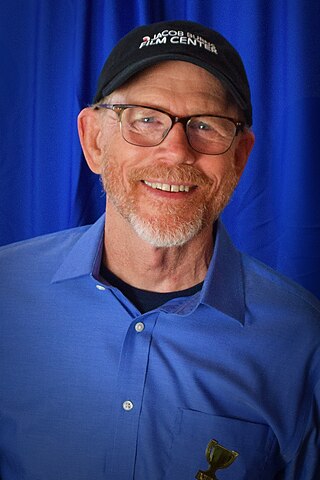
Ronald William Howard is an American director, producer, screenwriter, and actor. Howard started his career as a child actor before transitioning to directing films. Over his six decade career, Howard has received two Academy Awards, four Emmy Awards, two Golden Globe Awards, and a Grammy Award. He was awarded the National Medal of Arts in 2003 and was inducted into the Television Hall of Fame in 2013. Howard has two stars on the Hollywood Walk of Fame for his contributions in film and television.

The Chicago Tribune is an American daily newspaper based in Chicago, Illinois, owned by Tribune Publishing. Founded in 1847, and formerly self-styled as the "World's Greatest Newspaper", it remains the most-read daily newspaper in the Chicago metropolitan area and the Great Lakes region. In 2022, it had the seventh-highest circulation of any American newspaper.

The Chicago Sun-Times is a daily nonprofit newspaper published in Chicago, Illinois, United States. Since 2022, it is the flagship paper of the non-profit Chicago Public Media, and has long held the second largest circulation among Chicago newspapers, after the Chicago Tribune. The Sun-Times resulted from the 1948 merger of the Chicago Sun and the Chicago Daily Times newspapers. Journalists at the paper have received eight Pulitzer Prizes, mostly in the 1970s; one recipient was the first film critic to receive the prize, Roger Ebert (1975), who worked at the paper from 1967 until his death in 2013. Long owned by the Marshall Field family, since the 1980s ownership of the paper has changed hands numerous times, including twice in the late 2010s.
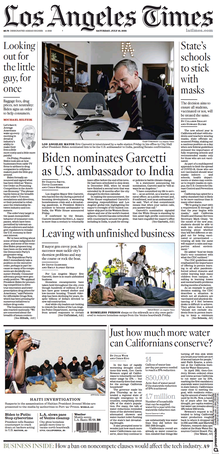
The Los Angeles Times is a regional American daily newspaper that started publishing in Los Angeles, California in 1881. Based in the Greater Los Angeles area city of El Segundo since 2018, it is the sixth-largest newspaper by circulation in the United States, as well as the largest newspaper in the western United States. Owned by Patrick Soon-Shiong and published by California Times, the paper has won more than 40 Pulitzer Prizes.
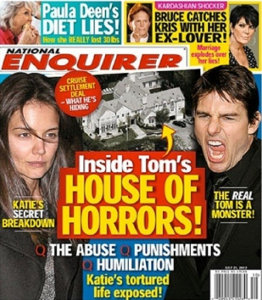
The National Enquirer is an American tabloid newspaper. Founded in 1926, the newspaper has undergone a number of changes over the years.

Night Shift is a 1982 American comedy film directed by Ron Howard. The film centers on a timid night-shift morgue employee whose life is turned upside down by a new co-worker who fancies himself a free-spirited entrepreneur. It stars Howard's Happy Days co-star Henry Winkler along with Michael Keaton, in his first starring role, and Shelley Long. Also appearing are Richard Belzer and Clint Howard. There are brief scenes with a young Kevin Costner as "frat boy #1", Shannen Doherty as a Bluebird scout, Vincent Schiavelli as a man who delivers a sandwich, and Charles Fleischer as one of the jail prisoners.
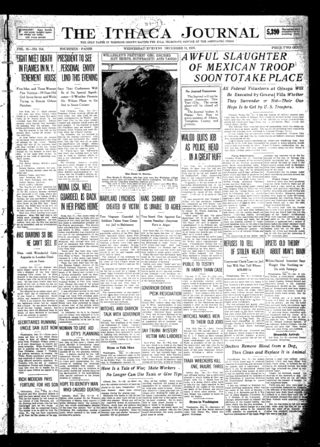
The Ithaca Journal is a daily morning broadsheet newspaper published in Ithaca, New York. It is locally edited and printed in Johnson City, New York, and publishes Monday through Saturday. It has been owned by Gannett since 1912.

David Koepp is an American screenwriter and director. He is the ninth most successful screenwriter of all time in terms of U.S. box office receipts with a total gross of over $2.3 billion. Koepp has achieved both critical and commercial success in a wide variety of genres: thriller, science fiction, comedy, action, drama, crime, superhero, horror, adventure, and fantasy.

Newsday is a daily newspaper in the United States primarily serving Nassau and Suffolk counties on Long Island, although it is also sold throughout the New York metropolitan area. The slogan of the newspaper is "Newsday, Your Eye on LI", and formerly it was "Newsday, the Long Island Newspaper". The newspaper's headquarters are located in Melville, New York.
Today was a national newspaper in the United Kingdom that was published between 1986 and 1995.

The Sun was a New York newspaper published from 1833 until 1950. It was considered a serious paper, like the city's two more successful broadsheets, The New York Times and the New York Herald Tribune. The Sun was the first successful penny daily newspaper in the United States, and was for a time, the most successful newspaper in America.

-30- is a 1959 film directed by Jack Webb and starring Webb and William Conrad as night managing editor and night city editor, respectively, of a fictional Los Angeles newspaper, loosely based on the real-life Los Angeles Herald-Examiner.
Chequebook journalism is the controversial practice of news reporters paying sources for their information. In the U.S. it is generally considered unethical, with most mainstream newspapers and news shows having a policy forbidding it. In contrast, tabloid newspapers and tabloid television shows, which rely more on sensationalism, regularly engage in the practice. In Britain and throughout Europe, journalists paying for news is fairly common.

Scandal Sheet is a 1952 American film noir directed by Phil Karlson. The film is based on the novel The Dark Page by Samuel Fuller, who himself was a newspaper reporter before his career in film. The drama features Broderick Crawford, Donna Reed and John Derek.

A Beautiful Mind is a 2001 American biographical film about the mathematician John Nash, a Nobel Laureate in Economics, played by Russell Crowe. The film is directed by Ron Howard based on a screenplay by Akiva Goldsman, who adapted the 1998 biography by Sylvia Nasar. In addition to Crowe, the film's cast features Ed Harris, Jennifer Connelly, Paul Bettany, Adam Goldberg, Judd Hirsch, Josh Lucas, Anthony Rapp, and Christopher Plummer in supporting roles. The story begins in Nash's days as a brilliant but asocial mathematics graduate student at Princeton University. After Nash accepts secretive work in cryptography, he becomes liable to a larger conspiracy, through which he begins to question his reality.
Jazz journalism was a term applied to American sensational newspapers in the 1920s. Focused on entertainment, celebrities, sports, scandal and crime, the style was a New York phenomenon, practiced primarily by three new tabloid-size daily newspapers in a fight for circulation. Convenient for readers on subways, the small-format papers were designed to display large page one photographs and headlines for newsstand sales. The tabloids' popularity was controversial, but also influenced the city's and nation's more traditional media, especially when columnist Walter Winchell became popular both in print and on the air.
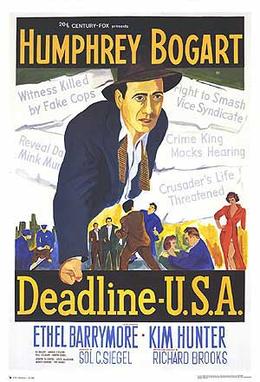
Deadline – U.S.A. is a 1952 American film noir crime film and starring Humphrey Bogart, Ethel Barrymore and Kim Hunter, written and directed by Richard Brooks. It is the story of a crusading newspaper editor who exposes a gangster's crimes while trying to keep the paper from going out of business; he is also attempting to reconcile with his ex-wife.
Stephen Koepp is a journalist, editor, and entrepreneur. As co-founder and Chief Content Officer of From Day One, a conference series and media outlet focusing on corporate values, Koepp is a regular media commenter on the relationship between companies and their employees, customers, and community As a business publication, From Day One produces news and original reporting on topics of corporate social responsibility, human resources, marketing, and communications, and is accredited by SHRM and HRCI. From Day One's conferences often feature academics, journalists, and authors, in addition to business leaders.
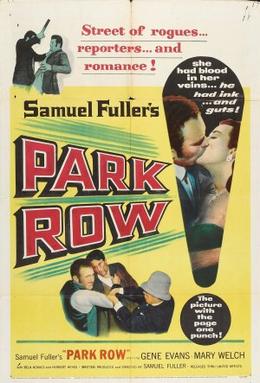
Park Row is a 1952 American drama film starring Gene Evans as a New York City journalist who founds a new type of newspaper in the 1880s and Mary Welch as the established publisher who opposes him. It was written, directed, produced and financed by Samuel Fuller, himself a New York reporter prior to turning to filmmaking. It was his favorite film, though it did not do well at the box office.
Journalism has been depicted frequently throughout the 20th century in American pop culture media, such as motion pictures and television. For decades, movies about journalism either have criticized bad journalism or celebrated good journalism. Since the 1930s, more than 100 films have had a journalism theme or recounted journalism history. Because of the early 20th century beginnings in the newspaper industry in the United States, these films focused on the print industry. After the 1976 release of “All the President's Men,” an increased number of young people inspired by the watchdog and investigative function of newspapers entered journalism programs at colleges and universities. As television and radio news launched into prominence in the 1960s and later, more movies about broadcast journalism were produced.














